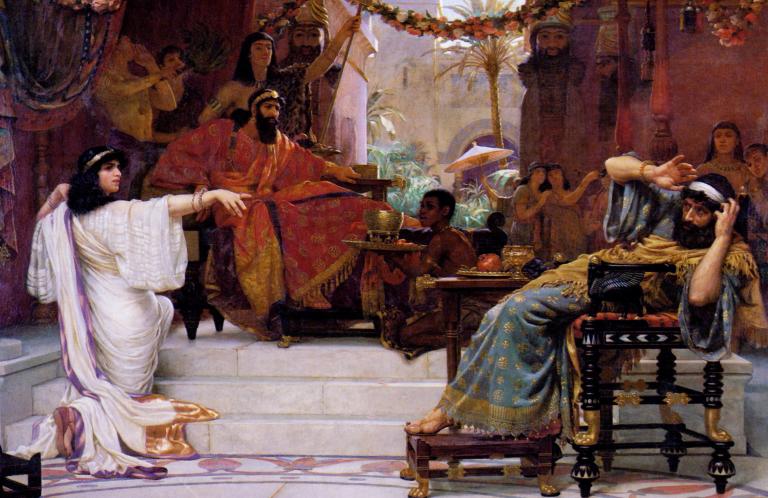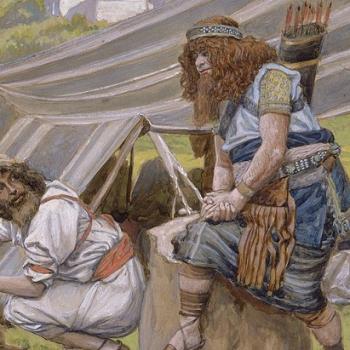
Christian missionaries often claim that the Qur’an is filled with factual errors; one of the most obvious being a man called Haman. In the Hebrew Bible Haman appears 45 times in the book of Esther where as the chief advisor to the Persian king and an anti-Semitic Jew-hater. In the Qur’an Haman is an advisor to the Egyptian Pharaoh (king) whose name appears six times in three different chapters in the Qur’an, 28: 6, 8, 38; 29:39; 40:24, 36).
The Qur’an neither relates, nor refers, to the specific event of Persian anti-Semitism. There was nothing new to learn from Persia. The king of Egypt was oppressing Jews almost 800 years earlier.
Instead, the Qur’an uses an archetypical, cruel, xenophobic character who always seeks to protect corrupt governments by causing strife and divisiveness among their oppressed people. In Egypt Haman plotted with Pharaoh to kill Jewish babies, and keep the divine Pharaoh in power:
“We [Allah] wanted to bestow favor on those [Jews] who were oppressed in the land (28:5) and to grant them power in the land, and make Pharaoh and Haman and their hosts [army] see what they had feared [come to pass]. (28:6) Then Pharaoh’s household picked him [Moses] up [from the water] that he may be their adversary and be a cause of sorrow to them. Surely Pharaoh and Haman and their hosts erred [in their plotting] (28:8).
Egypt and Persia are not the only places where such terrible events have been plotted; and the Jews are not the only people to be vilified, oppressed, expelled and massacred. So, Haman is even connected to the first case of arrogant rulers who sacrifice people through their own pride.
Ayah 28:38 states:
Pharaoh said, “O eminent ones, I have not known you to have a god other than me. So Haman ignite [a fire] for me on the clay [bricks] and make for me a tower that I may look at the God of Moses. And indeed, I do think he [Moses] is among the liars.”
And Ayahs 40:36–7:
And Pharaoh said, “O Haman, construct for me a tower that I might reach the ways—the ways into the heavens—so that I may look at the God of Moses; but indeed, I think he [Moses] is a liar. And thus was made attractive to Pharaoh the evil of his deed, and he was averted from the [right] way. And the plan of Pharaoh was not except in ruin.”
Not only does Pharaoh think he himself is a god, but, encouraged by Haman, he identifies with the primordial account of arrogance: the city of Babel and its tower.
Today’s Haman
This is not just ancient history. Today there are many anti-Semitic and Islamophobic political leaders and want-to-be leaders using slander and fear to cause sorrow and pain for all kinds of minorities.
The Qur’an is right when it uses an archetypical, cruel, xenophobic character named Haman to teach us never-ending truths about the dangerous plans of hate-spewing political leaders. Indeed, if you read the slanderous accusations Haman makes against the Jews of Persia you will see many similarities to today’s Hamans.
Then Haman said to King Xerxes, “There is a certain people dispersed among the peoples in all the provinces of your kingdom who keep themselves separate. Their customs are different from those of all other people, and they do not obey the king’s laws; it is not in the king’s best interest to tolerate them” (Esther 3:8).
The Jewish holiday of Purim which commemorates the downfall of the Persian Haman falls on March 21, 2019 this year. May the plans of all the modern haters, like Haman, end up like their predecessor. God is the best planner.
Rabbi Maller’s website is: www.rabbimaller.com. He blogs at the Times of Israel and his book ‘Judaism and Islam as Synergistic Monotheisms: A Reform Rabbi’s Reflections on the Profound Connectedness of Islam and Judaism’ (31 articles by Rabbi Maller previously published by Islamic web sites) is for sale ($15) on Amazon.













